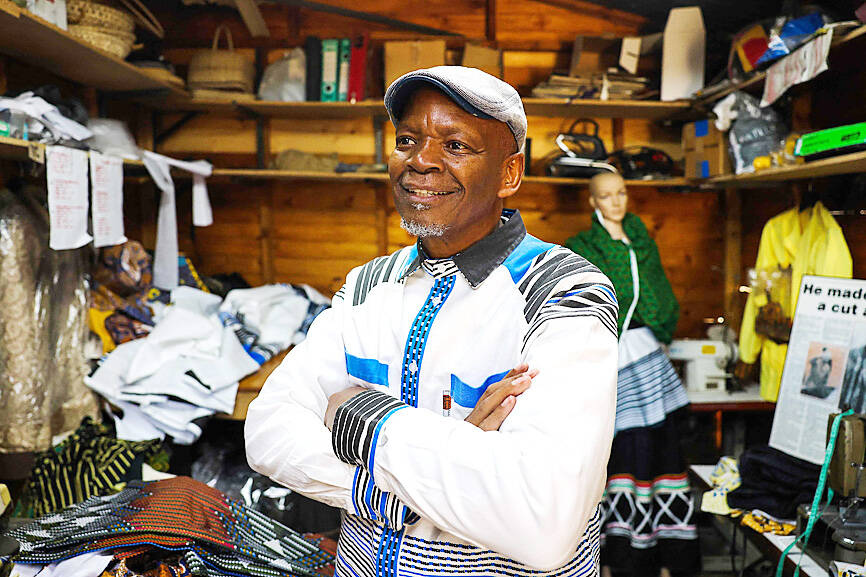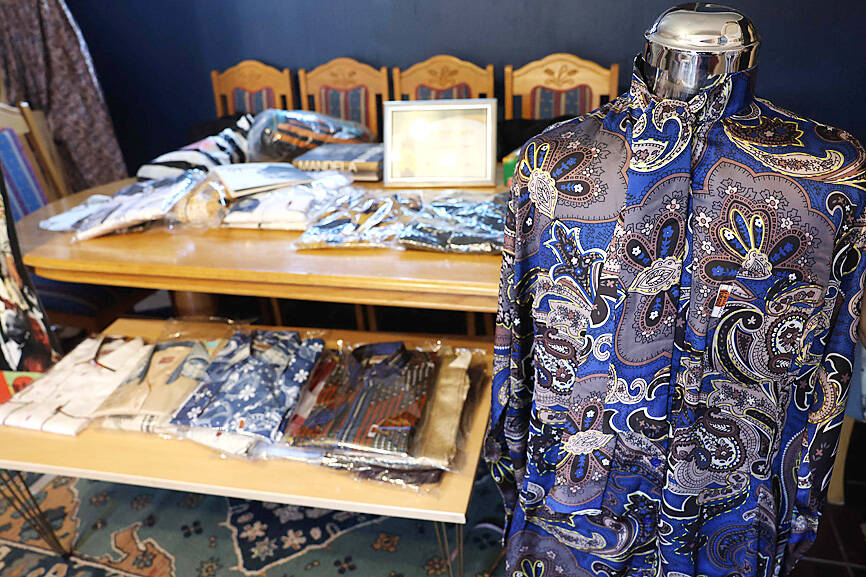In his workshop stocked with piles of fabric and sewing machines, Sonwabile Ndamase is proud that the Madiba shirts he designed for Nelson Mandela 30 years ago endure as a legacy of South Africa’s first democratically elected leader.
Worn untucked and without a jacket, the loose Madiba shirts remain a favorite among South African politicians, making a statement 10 years after Mandela’s death.
Madiba is the clan name by which Mandela became known in South Africa.

Photo: AFP
Ndamase’s clients include South African President Cyril Ramaphosa, as well as former South African presidents Thabo Mbeki and Jacob Zuma. The country’s political and business elite — including ministers, government spokespeople and local politicians — regularly place orders. Even former US president Bill Clinton and boxing great Mike Tyson have a Madiba shirt.
“Anybody who wants to live a Mandela legacy or who wants to live Mandela ethos in life, guess what they are doing? They will go and pick up Madiba shirts,” Ndamase said.
The jovial 64-year-old designer recalls when he was contacted by Winnie Mandela soon after the apartheid government released her husband from prison in 1990. Having spent 27 years in jail, the hero of the fight against white-minority rule and South Africa’s soon-to-be president needed new clothes.

Photo: AFP
Ndamase met Nelson Mandela in his home in Johannesburg’s Soweto.
“He started to tell me that he wanted something that could look conservative enough for him to go and address the captains of industry and ... then also to address the masses without having to change,” he said.
Nelson Mandela wanted a style that would make him stand out among other statesmen and did not require a tie.
The self-taught designer came up with the loose-fitting, casual-but-smart silk shirts with bold patterns that are associated with Nelson Mandela even after his death in 2013 at the age of 95. The shirts often feature oriental-style patterns. Some boast deep colors such as burgundy, dark gray and royal blue, with playful designs; others are of cooler, tan hues, depicting elements from nature such as leaves or twigs.
All are recognizable as the signature Nelson Mandela look. It is a style that Ndamase, who had a mild stroke in March, is passing on to a new generation of garment-makers.
The jocular designer — whose perfect impersonation of Nelson Mandela is a testament to their time spent together — is taking his know-how to New York in September to host a masterclass for young designers.
On the same trip, he plans to showcase his Vukani brand’s new collection at an event for celebrity and elite buyers that is to pay tribute to the 30 years of democracy since South Africa’s first democratic election in 1994.
The collection takes on a more casual, loungewear aesthetic, a breakaway from his usual style, Ndamase said.
The occasion is to feature in a documentary by a US-based filmmaker about Ndamase’s career.
Sporting a gray goatee, Ndamase laughs off the many other designers who claim to have pioneered the Madiba shirt or sell versions resembling his own, which today cost about 1,800 rands (US$100) apiece.
Once described by the late Winnie Mandela as “part of the furniture,” he said never wanted to use the Mandela name for commercial purposes.
“I dressed one generation to another,” he said. “The relationship I had was a family relationship.”

Vincent Wei led fellow Singaporean farmers around an empty Malaysian plot, laying out plans for a greenhouse and rows of leafy vegetables. What he pitched was not just space for crops, but a lifeline for growers struggling to make ends meet in a city-state with high prices and little vacant land. The future agriculture hub is part of a joint special economic zone launched last year by the two neighbors, expected to cost US$123 million and produce 10,000 tonnes of fresh produce annually. It is attracting Singaporean farmers with promises of cheaper land, labor and energy just over the border.

US actor Matthew McConaughey has filed recordings of his image and voice with US patent authorities to protect them from unauthorized usage by artificial intelligence (AI) platforms, a representative said earlier this week. Several video clips and audio recordings were registered by the commercial arm of the Just Keep Livin’ Foundation, a non-profit created by the Oscar-winning actor and his wife, Camila, according to the US Patent and Trademark Office database. Many artists are increasingly concerned about the uncontrolled use of their image via generative AI since the rollout of ChatGPT and other AI-powered tools. Several US states have adopted

A proposed billionaires’ tax in California has ignited a political uproar in Silicon Valley, with tech titans threatening to leave the state while California Governor Gavin Newsom of the Democratic Party maneuvers to defeat a levy that he fears would lead to an exodus of wealth. A technology mecca, California has more billionaires than any other US state — a few hundred, by some estimates. About half its personal income tax revenue, a financial backbone in the nearly US$350 billion budget, comes from the top 1 percent of earners. A large healthcare union is attempting to place a proposal before

KEEPING UP: The acquisition of a cleanroom in Taiwan would enable Micron to increase production in a market where demand continues to outpace supply, a Micron official said Micron Technology Inc has signed a letter of intent to buy a fabrication site in Taiwan from Powerchip Semiconductor Manufacturing Corp (力積電) for US$1.8 billion to expand its production of memory chips. Micron would take control of the P5 site in Miaoli County’s Tongluo Township (銅鑼) and plans to ramp up DRAM production in phases after the transaction closes in the second quarter, the company said in a statement on Saturday. The acquisition includes an existing 12 inch fab cleanroom of 27,871m2 and would further position Micron to address growing global demand for memory solutions, the company said. Micron expects the transaction to